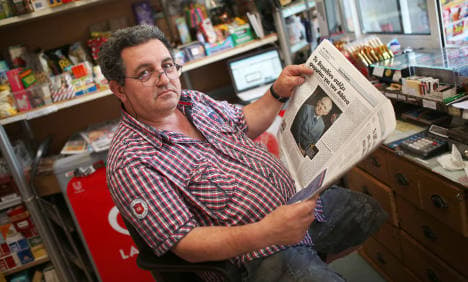Germany's Greeks look anxiously homeward

As crisis engulfs their homeland, members of the Greek community in Germany look anxiously homeward and reflect on how the crisis is already traveling back to Germany.
At Antonius Chantzaras' kiosk in Offenbach one can find newspapers from the whole world. Papers in German, English and Greek are constantly being sold over the counter.
But it's irrelevant what language they are in today. All of them are talking about the same thing: Greece, Chantzaras' homeland.
"Europe is playing a game with Greece," he says, adding that there are no winners in this situation, but plenty of losers.
The most recent developments have already affected his parents, albeit not as badly as others.
After the collapse of negotiations between Greece and its lenders over the weekend, banks in the south European country have remained closed, with Greeks only allowed to withdraw €60 per day from ATMs.
In the cities rising prices have already led to catastrophe for many.
Chantzaras' parents live in a village, which he sees as a stroke of luck.
"Everyone there has their own house, their own garden and their own animals," he explains, saying village folk can look after themselves.
Destina Kivriki feels much the same way.
"In Thessalonika people are starving,“ says the 37-year-old about the second largest city in the country, where her family lives.
But she says that her parents and siblings are still getting by.
They have a food store and take care of people who can't afford food, she adds. But she says she has heard stories that remind you of Africa.
"I was talking on the telephone with a family who have to get by on three euros a day. That's not even enough to get the kids ice cream."
As a member of the Greek community association in Offenbach, Kivriki has her hands full. Around 4,700 Greeks live there according to the city administration – that's around 17 percent of all foreigner EU citizens in the town – and the number is rising.
"More and more [Greeks] are coming to us," says Kivriki. They are fleeing poverty, she explains, trying to find a better life.
But this is easier said than done.
"Few of them can speak German, but the language courses are overflowing," she says, adding that it's "completely impossible" for them to get a job under such conditions.
Germany's Greek population is also looking anxiously toward the referendum set to take place in Greece on July 5th, when the Greek population will vote on whether to accept the reform package proposed by the European Union, European Central Bank and the International Monetary Fund.
"I hope that the Greek people vote to stay in the euro," says Nikolaus Athanassiadis, a lawyer and chair of the Greek community association in Frankfurt.
Any other result, he says, would "throw the country, not only years, but decades back into the past."
Comments
See Also
At Antonius Chantzaras' kiosk in Offenbach one can find newspapers from the whole world. Papers in German, English and Greek are constantly being sold over the counter.
But it's irrelevant what language they are in today. All of them are talking about the same thing: Greece, Chantzaras' homeland.
"Europe is playing a game with Greece," he says, adding that there are no winners in this situation, but plenty of losers.
The most recent developments have already affected his parents, albeit not as badly as others.
After the collapse of negotiations between Greece and its lenders over the weekend, banks in the south European country have remained closed, with Greeks only allowed to withdraw €60 per day from ATMs.
In the cities rising prices have already led to catastrophe for many.
Chantzaras' parents live in a village, which he sees as a stroke of luck.
"Everyone there has their own house, their own garden and their own animals," he explains, saying village folk can look after themselves.
Destina Kivriki feels much the same way.
"In Thessalonika people are starving,“ says the 37-year-old about the second largest city in the country, where her family lives.
But she says that her parents and siblings are still getting by.
They have a food store and take care of people who can't afford food, she adds. But she says she has heard stories that remind you of Africa.
"I was talking on the telephone with a family who have to get by on three euros a day. That's not even enough to get the kids ice cream."
As a member of the Greek community association in Offenbach, Kivriki has her hands full. Around 4,700 Greeks live there according to the city administration – that's around 17 percent of all foreigner EU citizens in the town – and the number is rising.
"More and more [Greeks] are coming to us," says Kivriki. They are fleeing poverty, she explains, trying to find a better life.
But this is easier said than done.
"Few of them can speak German, but the language courses are overflowing," she says, adding that it's "completely impossible" for them to get a job under such conditions.
Germany's Greek population is also looking anxiously toward the referendum set to take place in Greece on July 5th, when the Greek population will vote on whether to accept the reform package proposed by the European Union, European Central Bank and the International Monetary Fund.
"I hope that the Greek people vote to stay in the euro," says Nikolaus Athanassiadis, a lawyer and chair of the Greek community association in Frankfurt.
Any other result, he says, would "throw the country, not only years, but decades back into the past."
Join the conversation in our comments section below. Share your own views and experience and if you have a question or suggestion for our journalists then email us at [email protected].
Please keep comments civil, constructive and on topic – and make sure to read our terms of use before getting involved.
Please log in here to leave a comment.